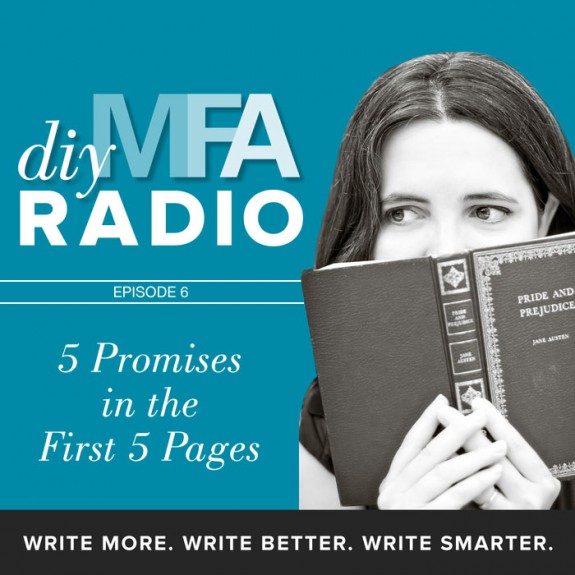The first five pages of your manuscript are SO important. Not only do they set the tone for your entire story, but when you submit your novel to an agent, the first five pages are the first thing (aside from your query) that the agent is going to see.
This means that you have to get these five pages just right. In this episode, we’ll discuss five promises you make in those essential first five pages of your story.
1) You promise a character.
From the start your readers will want to know who they’re supposed to root for. Sometimes writers will artfully delay the appearance of the main character in order to create anticipation or to reflect the character’s personality, but this is very unusual. In most cases, the protagonist usually appears in the first chapter, and is often the very first character the reader sees.
2) You promise the voice.
The voice of the narration is central to establishing the mood of the story. Compare the opening sentences to the following novels and notice the different moods that they convey. Listen to the episode for more examples, but here are two to get you started.
3) You promise the world.
It doesn’t matter what genre you’re writing, you have to let the reader into your world and it must feel real. This applies whether you’re writing a contemporary story set in a average suburb, or some elaborate fantasy story set in another dimension. The reader needs to believe in your world and the best way for you to make that happen is for you to believe in it yourself.
Another thing to remember about promising your world is that when it comes to detail, a little goes a long way. Writers are often tempted to give as much detail about setting as possible, thinking that the more details they share the more real the world will become. This is especially true for fantasy stories, where the writer may worry that the reader won’t “get” the setting if they don’t describe every last inch.
Just as readers trust the writer to give them a world that feels real, the writer must trust the readers to suspend their disbelief and invest in that world.
4) You promise a problem.
From the first page, your reader has to know that there’s a problem the character is facing. Whether that problem is explicit (like the family’s financial state in Pride and Prejudice) or a mystery (like in If I Stay) we know from the first moment that the character is facing some difficulty, some problem. This promise is essential because whatever this problem is, it will be important in establishing the central conflict for your story.
5) You promise an event.
Every book or story opens with some sort of event that kick-starts the story. Your reader will be waiting for that event, so as a writer you need to follow through. If you delay that event for too long, your reader might lose interest or, worse yet, stop reading altogether. The sooner you set your story in motion, the sooner you can hook your reader.
Take-home message:
In the end, it all comes down to building a level of trust with your reader. When you deliver on these promises, you’re showing your readers that they are in good hands and that you know what you’re doing. Then when you take risks in your writing with an artful purpose, you’re also letting the readers know that you trust them as well. Ultimately, the reader-writer relationship is one of trust. Readers trust writers not to go back on their promises or play tricks on them and writers must trust readers to be smart and understand what they’re doing.
Resource Recap:
Link to Episode 6
(Right-click to download.)
I’m also thrilled to announce that our flagship course DIY MFA 101 is open for registration! This course is designed to write that story you’ve always dreamed of and get it in the hands of your reader. The class covers the seven key tools for success that all writers must know, and gives you practical techniques to apply these tools to your own work.
Click the link to sign up or learn more about DIY MFA 101.
If you liked this episode…
Head over to iTunes, leave a review, and subscribe so you’ll be first to know when new episodes are available. Also, if you know anyone who might enjoy this podcast, please share!
Until next week, keep writing and keep being awesome.








